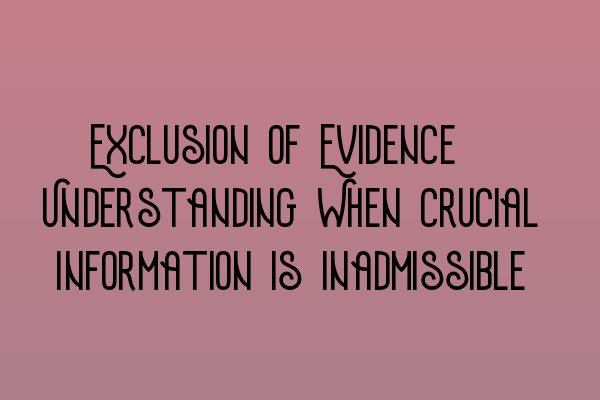Exclusion of Evidence: Understanding When Crucial Information is Inadmissible
Welcome to SQE Criminal Law & Practice Law UK! In this comprehensive blog post, we will dive deep into the intricacies of the exclusion of evidence in criminal law cases. As experienced solicitors, writers, and SEO experts, we aim to provide you with valuable insights and understanding on this crucial topic.
Why is Exclusion of Evidence Important?
The exclusion of evidence plays a vital role in ensuring a fair trial and maintaining the integrity of the criminal justice system. It prevents evidence that is obtained unlawfully or in violation of a defendant’s rights from being presented in court. This safeguard helps to preserve the fundamental principle that no one should be convicted based on unfair or unreliable evidence.
Understanding when evidence is deemed inadmissible is essential for both legal professionals and those seeking to navigate the complexities of the criminal justice system. Let’s explore some common scenarios where evidence may be excluded.
1. Illegally Obtained Evidence
One of the primary reasons for the exclusion of evidence is if it has been obtained in violation of a person’s rights, such as through an illegal search or seizure. The courts aim to deter law enforcement from engaging in unconstitutional practices and send a clear message that evidence obtained unlawfully will not be admissible in court.
If you believe that evidence against you has been obtained illegally, it is crucial to seek legal advice from qualified professionals like the solicitors at SQE Criminal Law & Practice Law UK. They will analyze the circumstances surrounding the evidence and determine the best course of action to challenge its admissibility.
2. Unreliable or Hearsay Evidence
Evidence that is unreliable or hearsay, meaning it is based on second-hand information or rumors, may also be excluded. This is to prevent the possibility of presenting misleading or unreliable evidence that could unfairly impact the outcome of a trial.
If you are facing criminal charges and suspect that the evidence against you falls into this category, our solicitors can assist in assessing the credibility and admissibility of the evidence. They can help you challenge the evidence effectively and present your case with the highest level of professionalism and expertise.
3. Privileged Information
Privileged information, such as confidential communications between lawyer and client, is generally protected from being used as evidence in court. This privilege exists to foster open and honest communication between legal representatives and their clients, without the fear of it being used against them.
However, it is crucial to understand that the privilege may not apply in certain circumstances, such as when the client communicates their intention to commit a future crime. In such cases, the courts may consider the disclosure of this privileged information admissible in the interest of public safety.
4. Prejudicial or Tainted Evidence
Evidence that is considered unduly prejudicial or tainted may also be excluded. This includes evidence that may inflame the jury or unfairly influence their decision-making process. The courts strive to ensure that trials are fair, and excluding such evidence helps maintain the integrity of the judicial process.
If you believe that evidence presented against you may be unduly prejudicial or tainted, it is imperative to consult with skilled solicitors who can meticulously analyze the situation and present strong arguments for its exclusion.
Here at SQE Criminal Law & Practice Law UK, we offer comprehensive SQE 1 and SQE 2 preparation courses to equip aspiring solicitors with the necessary knowledge and skills to excel in their legal careers. Our courses are designed to provide practical insight and help you build a solid foundation in criminal law and practice.
For further preparation, we also offer SQE 1 practice exam questions and SQE 1 practice mocks (FLK1 and FLK2) to assess your readiness for the exams. Additionally, stay updated with the latest SRA SQE exam dates to plan your studies effectively.
Understanding the exclusion of evidence is crucial for any legal professional or individual navigating the criminal justice system. If you require expert guidance or representation, contact the solicitors at SQE Criminal Law & Practice Law UK. Our team is dedicated to upholding the principles of justice and protecting the rights of our clients.
Thank you for reading this extensive post on the exclusion of evidence. We hope it has provided you with a meaningful understanding of when crucial information is deemed inadmissible. Stay tuned for more informative articles from SQE Criminal Law & Practice Law UK!
